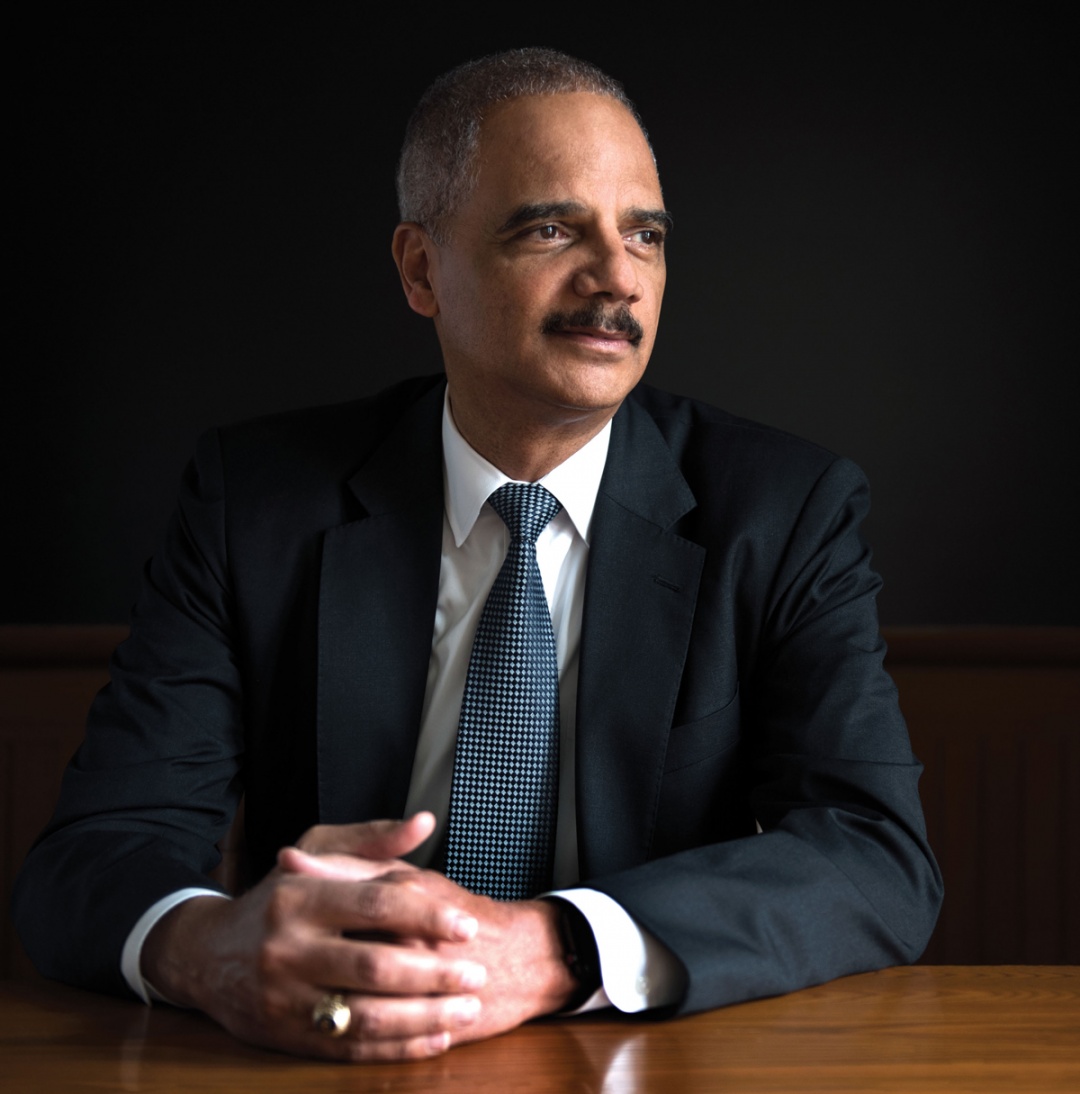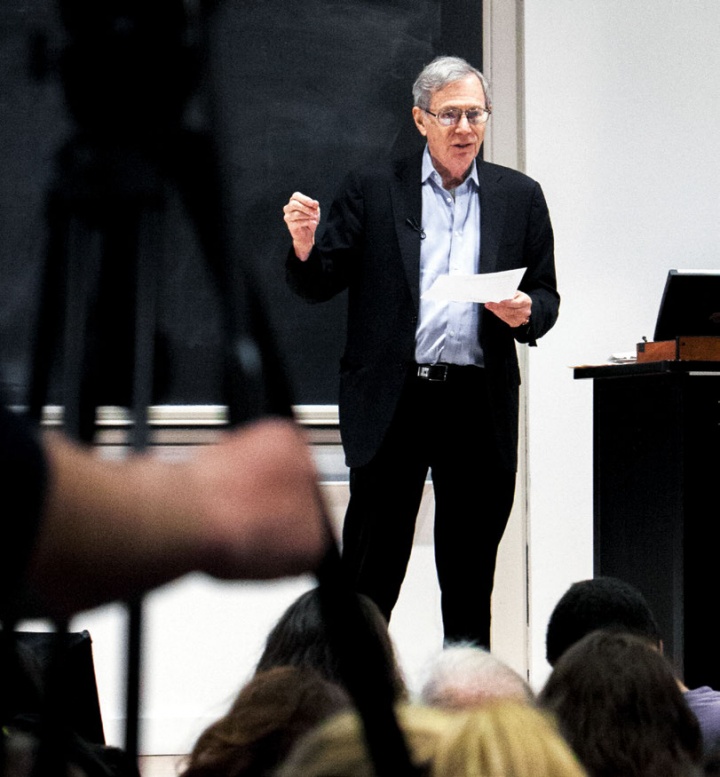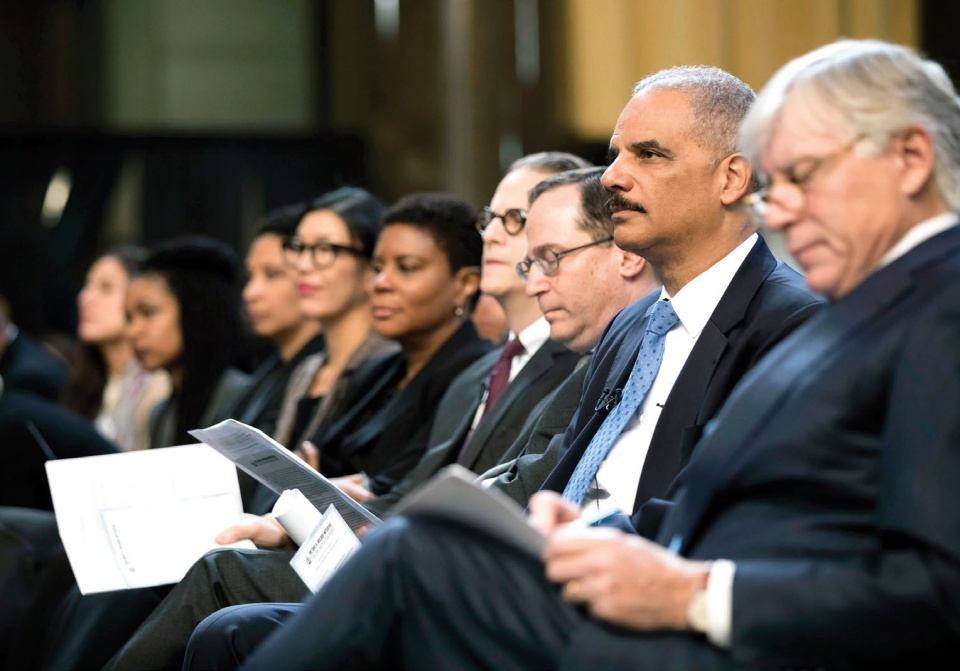Eric H. Holder Jr. ’73, LAW’76 leads a
social justice initiative he calls “a love letter”
to the College and the country.
Columbia College | Columbia University in the City of New York
Eric H. Holder Jr. ’73, LAW’76 leads a
social justice initiative he calls “a love letter”
to the College and the country.

Rayon Richards
Eric H. Holder Jr. ’73, LAW’76 loves Columbia. And Columbia loves him back — the former U.S. Attorney General has been a University trustee and a Class Day and Dean’s Day speaker (in 2009 and 2013, respectively); was a 1996 recipient of a John Jay Award for distinguished professional achievement; and was the 2015 recipient of the Alexander Hamilton Medal, the highest honor bestowed to a member of the Columbia College community.
In November, the College launched the Eric H. Holder Jr. Initiative for Civil and Political Rights; the Initiative will sponsor courses, public events, student internships and fellowships to amplify the Core Curriculum’s discourse on justice and civil and political rights. Discouraging retreat into what Holder calls “the quiet prejudice of inaction,” it will encourage students to “live the Core” by supporting their civic action on and beyond campus. The Initiative kicked off in January by hosting The American Voter Project, a five-part series that explored the state of voting in the United States. A new course, “Power, Rights, and Social Change: Achieving Justice,” which bridges the Core and contemporary issues of social justice, was taught in the spring semester.
Holder’s commitment to just societies extends beyond the Gates. As the chairman of the National Democratic Redistricting Committee, he is fighting for fairly drawn district lines to be mapped after the census in 2020. In October he called on Congress to impose changes that could reduce mass incarceration. And he was a lead consultant for Starbucks’ racial bias awareness training, which was administered to more than 175,000 employees nationally on May 29, in response to an incident in which two black men were arrested while waiting for a business meeting to start at a Philadelphia store.
Columbia College Today spoke with Holder in late April about how the Initiative got started, his hopes for our country and how the College continues to influence his life. >>
Q: You have said that the College “generated a real desire [in you] to explore the underlying truths” about human rights issues. Was there a particular experience that led you to that?
A: I think the initial desire was sparked by Contemporary Civilization, in my first year. Studying the great thinkers and the fundamental questions they raised about how people interact with one another: What are people like in the state of nature? How do people interact when there are more formal governance structures in place? And then expanding on that — how have people used power and abused power? It sparked in me something that I didn’t necessarily expect to have happen — an interest in human rights and the relationship of the individual to governing authorities. I’d always been interested in history, and this kind of honed that interest, made it more specific.
Q: You were certainly on campus at an interesting time.
A: It was an interesting time! I got here the year after the 1968 event. We were on the other side of it but the echoes were still very much there.
Q: Were there any professors who especially made an impression?

Eric Foner ’63, GSAS’69 made a significant impression on Holder as an undergrad.
Ashok Sinha
A: I think about Hollis Lynch, Dwight Miner [’26, GSAS’40] … Eric Foner [’63, GSAS’69], obviously. I remember sitting in Foner’s class, maybe it was “America After the Civil War,” and he said, “The history of America in the 19th century is the history of the black man.” Whoa. He was teaching Reconstruction history in a way that’s more generally accepted now, but at the time it was groundbreaking. He was asking questions that people had not asked up until that point and finding what I think are hard truths.
He was a real pioneer and a real influence.
Q: What inspired you to spearhead the Initiative with Dean [James J.] Valentini?
A: What I thought was, I got the best liberal arts education you could possibly get here at the College — both in terms of what I learned in the classroom and also being at Columbia at that time. It was a very activist period, we protested a variety of things — the war in Vietnam, Kent State. I was in class learning these very interesting philosophical things and then there was the world as it existed in which I lived, and it always seemed to me that there was a bit of a disconnect. There was a need for some connective tissue between that which I learned in the classroom and that which I experienced in the real world. And I thought the Initiative would be a way in which we might be able to do that: If we can help students take some of what they have learned and the questions that have been generated by their studies, and apply them to the issues they’ll face. For example, what Kant, Hume or Aristotle would say about politics, about human nature, about government — let’s see how that impacts the student’s view of contemporary society. Let’s apply it to the 21st century and see what that’s like. We prepare Columbia students so well with what they learn here in the classrooms; we can augment that with real-world experience and take the best and brightest and make them ready to lead this nation.
Q: It feels like 2018 is an ideal time for this. Can you elaborate on how the
Initiative’s tenets are so necessary and urgent for College students today?
A: We’re at the beginnings of what I’ve come to call “a period of American engagement.” In some ways, the silver lining to what I feel is a very disturbing period is to see the reaction of the American people. Almost immediately after the inauguration was the [first] Women’s March; more recently, the march of young people to protest the lack of action when it comes to dealing in a sane, logical way with gun violence. And a whole range of issues and involvement in between. I think one of the things we’re going to see come out of this period is a revitalized interest in our civic life and the notion that you have to participate. And this is what the Initiative is really all about — if you are going to be a good citizen, you have to be a participant. You can’t merely be an observer. You need to be knowledge based, you need to have a grounding for the ideas and theories you want to expound, and you need to take the abilities that are polished here at Columbia and use them in the real world, for good.
There was a need for some connective tissue between that which I learned in the classroom and that which I experienced in the real world.
Q: And for the long haul.
A: Exactly. This isn’t a “for now” thing, this is a lifetime thing. Someone gave me a button recently that says STAY WOKE. It doesn’t matter what your age is, as long as you are an American citizen and you care, you need to be involved.
Q: In what way do you think civil and political rights are most threatened right now?
A: The thing that worries me most is that a lot of the norms that govern our society are being either challenged or discarded. I think our legal system is holding, and I think people will ultimately be held accountable for any crimes they may have committed. But there are norms being broken that worry me a great deal; for instance, the ways in which the White House interacts with the Justice Department. There is nothing written that says a President should not direct an Attorney General to do something or take a particular action, but that is a norm that has always been followed. And when it’s not been followed, it has resulted in negative consequences. Another norm is having a healthy respect for the press and the function of the media. If you’re in public life, sometimes you don’t agree with things that are written about you, or sometimes things are wrong. I’ve been upset by articles, but I never questioned the value of the press — to attack the press is something that I think is unique to this administration, something we’ve not seen in the United States. But alarmingly, it’s something we’ve seen in other places and at other times. I think we do ourselves a great disservice and put our democracy at risk if we don’t understand that as entrenched as it seems, our democracy is still a fragile thing. And it depends on vigilance, involvement and principled opposition when that’s appropriate. Unless we do those kinds of things we can end up in a country that’s fundamentally different from the one we’ve had for more than 200 years and that we too often take for granted. There are still a whole range of issues in this imperfect nation, but in a lot of ways this initiative is almost like a love letter to this institution and this country, a means by which I can play a small part in ensuring that those people who are best qualified have the greatest opportunity to lead.

Holder at the Initiative launch in November 2017.
Ben Hider
Q: So you are hopeful?
A: I’m an optimistic person. I’m as optimistic now as when I walked up College Walk for the first time. I also believe in the possibility of positive change, but positive change doesn’t just happen. You have to make it happen. Change happens because people focus on an issue, identify a wrong and then commit themselves to righting that wrong. Doing all the things that are necessary: protesting, challenging an unjust status quo. The easiest thing is to go along. I’ve been extremely lucky in my life; I suppose I could just go along and go to my job and go home, but that’s not what Columbia people do. That’s not why you come to this place.
Q: Speaking of positive change, let’s talk about Starbucks. How did that
come about?
A: I got a call after the incident in Philadelphia; [Starbucks CEO] Kevin Johnson asked me to be on a panel to deal with the notion of unconscious bias. What I liked about Starbucks was that early on, from the highest levels, it was made clear that what happened there was wrong, without trying to sugarcoat it. We want to find a way in which to make sure it doesn’t happen again.
But I also think that we as a nation should not find comfort in the notion that this is a Starbucks problem. This is way bigger than an iconic American company. The whole question of unconscious bias is something that impacts all of us.
Q: Do you think the training will be effective?
A: I hope in the Starbucks context it will be useful for their employees, but it’s also something that we as a nation should somehow engage in. I think about the relationship between communities of color and the valiant men and women who serve in law enforcement. If I could shape the training that people in law enforcement went through, I think I’d have modules: one would be about unconscious bias and the use of force, and how you protect yourself when it comes to violent encounters; and then with regard to people in these communities of color, [to create] a greater understanding of how difficult it is to be a person in law enforcement. You could build up the necessary trust that I think has eroded over the years and make those relationships better.
I think that in some ways, there’s a line from that Starbucks in Philadelphia to these larger societal questions. I think the training can be effective, and I think it’s a start. If it’s successful, if we can come up with a metric and make a determination that this effort has been successful, why not expand it? Let’s have other companies do this training, governmental agencies do the same thing. If we can take a more widespread examination of the question of unconscious bias, the experience those two young men had to deal with in Philadelphia might actually be worth it.
Q: What is your long-term vision for the Initiative? Is it something you’d like to see become a national program?
A: My dream at this point is for this initiative to become an integral part of the Columbia experience, and imbue it with a flexibility so that it has the capacity to deal with whatever the civil and political rights issues will be 50 years from now, or 100 years from now. My hope would be in the same way that Contemporary Civilization has lasted for so long, that maybe this initiative will last as long.
I’d like to think this might extend to something larger in other places, but my particular concern is with the institution to which I owe so much and that I love so much, so I want it to be here. There are very few things that I care about having my name on — this is one thing that matters to me. That this becomes part of the Columbia DNA. Long after I’m gone, people might think about The Holder Initiative and in some ways associate me with what I think will be a great launching pad for social change, for justice. As long as Columbia is in the lead, I’m happy.

Published three times a year by Columbia College for alumni, students, faculty, parents and friends.
Columbia Alumni Center
622 W. 113th St., MC 4530, 6th Fl.
New York, NY 10025
212-851-7852
cct@columbia.edu

Columbia Alumni Center
622 W. 113th St., MC 4530, 4th Fl.
New York, NY 10025
212-851-7488
ccalumni@columbia.edu